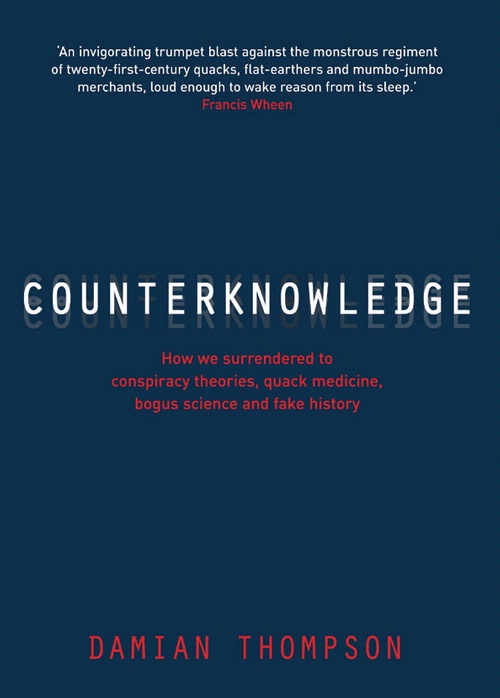This excellent little book, if supplemented by a single brief sentence – a draft of which I offer below – should be put in the satchel of every secondary school child, in the departmental pigeonhole of every undergraduate, and in the hands of every officer of every quango called Ofsomething. Widely enough read and clearly enough understood, it might save us from the tsunami of misinformation, misinterpretation, falsity, error and distortion that infects our culture in the guise of conspiracy theories, spurious history, alternative medicine, and much other cock-and-bull besides – all of which Damian Thomson calls “counterknowledge” and which he debunks with great clarity and efficiency.
 The principal targets of Thomson’s attack are creationism and Intelligent Design, alternative and complementary medicine, pop nutrition theories, and pseudohistory and pseudoarchaeology as variously purveyed in The Da Vinci Code, Gavin Menzies’ 1421: the Year China Discovered the World and the books of that mendacious garbage-producer-in-chief Graham Hancock. But he also does not spare the retail chains, Boots among them, which sell homeopathic “remedies”, and the publishers – including such highly respectable firms as Penguin, Routledge and Random House – which produce books of the Hancock and Menzies ilk.
The principal targets of Thomson’s attack are creationism and Intelligent Design, alternative and complementary medicine, pop nutrition theories, and pseudohistory and pseudoarchaeology as variously purveyed in The Da Vinci Code, Gavin Menzies’ 1421: the Year China Discovered the World and the books of that mendacious garbage-producer-in-chief Graham Hancock. But he also does not spare the retail chains, Boots among them, which sell homeopathic “remedies”, and the publishers – including such highly respectable firms as Penguin, Routledge and Random House – which produce books of the Hancock and Menzies ilk.
Thomson’s neat definition of counterknowledge is “misinformation packaged as fact”, and the prompt for his taking arms against it is that he sees a “pandemic of credulous thinking” facing the twenty-first century as counterknowledge in all its insidious forms proves increasingly profitable and becomes increasingly widespread. He identifies the free market in ideas and the internet as two mutually potentiating causes of counterknowledge’s rapidly increasing proliferation. This is surely right, though they are not of course the causes of counterknowledge as such, for its roots lie very deep in the past; it was once practically the only knowledge anyone had, for it took the form of religious orthodoxy. But after the Reformation permitted the proliferation of alternative religious counterknowledges there was no stopping the process: Rosicrucianism, Freemasonry, Kabbalah, occult sciences and secret bodies of knowledge, whether new or old in 16th- and 17th- century terms, proliferated likewise and provide the model for a great deal of today’s counterknowledge.
He might also have added the failure of education to provide robust skills of critical thinking and constructive scepticism, coupled with the discipline of being constrained by evidence and the ability to reflect upon it rationally.
The sentences that need to be added to this otherwise superb crusade against despoliation of truth and reason concern what harsh critics would, I am sure wrongly and unfairly, call a sleight-of-hand by Thomson, given that when he is not debunking counterknowledge he is none-too-indirectly associated with one of its most egregious forms by being the editor of the Catholic Herald. Early in his book he says that religion “does not fit neatly into the category of counterknowledge” because its claims are not about the material world and cannot be tested empirically. And he leaves it there; protected, you might say, behind the wholly admirable pyrotechnics of his assault on “misinformation masquerading as fact” to be found elsewhere.
This, I am afraid, will not do. As already suggested, the most persistent and influential forms of counterknowledge, including many false claims about the origin and nature of the universe, what it contains and what it is influenced by, which heavenly bodies go round which, what can be effected by prayer or the laying on of hands, and so vastly on, are the religions. Thomson rightly criticises the fact that the British state supports five homeopathic hospitals and pays for six degree courses in homeopathy, but says nothing about tax-funding of faith-based schools – not a few teaching creationism. He quotes Popper on falisifiability as the test of a genuine knowledge claim, but does not mention Popper’s correlative stricture, that “a theory which explains everything explains nothing”, as a direct refutation of the meaningfulness of religious claims.
He grants that religion becomes counterknowledge when it is controverted by the evidence of our senses, but does not admit that all religion is therefore so. He does not address the point that when factual information is lacking with respect to some claim – as is standardly the case with the major tenets of religion – constraints of rationality come into play; and thus the reason why we reject the notion that the Norse or Olympian gods exist is exactly the same as our reason for rejecting the notion that a Jewish or Catholic god exists.
So the sentence to be added to this otherwise smashing book is: “No religious claim escapes the strictures about counterknowledge so eloquently here described.”
Counterknowledge is published by Atlantic Books

